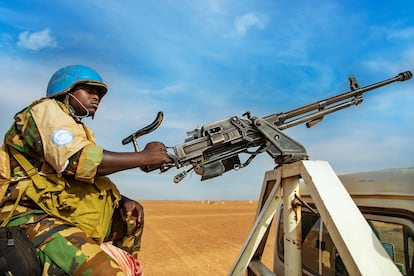UN experts say Islamic State group almost doubled the territory they control in Mali in under a year
The stalled implementation of the peace deal and sustained attacks on communities have offered the IS group and al-Qaida affiliates a chance to expand and regain control of areas

Islamic State extremists have almost doubled the territory they control in Mali in less than a year, and their al-Qaida-linked rivals are capitalizing on the deadlock and perceived weakness of armed groups that signed a 2015 peace agreement, United Nations experts said in a new report.
The stalled implementation of the peace deal and sustained attacks on communities have offered the IS group and al-Qaida affiliates a chance “to re-enact the 2012 scenario,” they said.
That’s the year when a military coup took place in the West African country and rebels in the north formed an Islamic state two months later. The extremist rebels were forced from power in the north with the help of a French-led military operation, but they moved from the arid north to more populated central Mali in 2015 and remain active.
In August 2020, Mali’s president was overthrown in a coup that included an army colonel who carried out a second coup and was sworn in as president in June 2021. He developed ties to Russia’s military and Russia’s Wagner mercenary group whose head, Yevgeny Prigozhin, was reportedly killed in a plane crash on a flight from Moscow this week.
The 2015 peace agreement was signed by three parties: the government, a pro-government militia and a coalition of groups who seek autonomy in northern Mali.
The panel of experts said in the report circulated Friday that the impasse in implementing the agreement — especially the disarmament, demobilization and reintegration of combatants into society — is empowering al-Qaida-linked Jama’a Nusrat ul-Islam wa al-Muslimin, known as JNIM, to vie for leadership in northern Mali.
Sustained violence and attacks mostly by IS fighters in the Greater Sahara have also made the signatories to the peace deal “appear to be weak and unreliable security providers” for communities targeted by the extremists, the experts said.
JNIM is taking advantage of this weakening “and is now positioning itself as the sole actor capable of protecting populations against Islamic State in the Greater Sahara,” they said.
The panel said Mali’s military rulers are watching the confrontation between the IS group and al-Qaida affiliate from a distance.
The experts cited some sources as saying the government believes that over time the confrontation in the north will benefit Malian authorities, but said other sources believe time favors the terrorists “whose military capacities and community penetration grow each day.”
“In less than a year, Islamic State in the Greater Sahara has almost doubled its areas of control in Mali,” the panel said, pointing to its control now of rural areas in eastern Menaka and large parts of the Ansongo area in northern Gao.
In June, Mali’s junta ordered the U.N. peacekeeping force and its 15,000 international troops to leave after a decade of working on stemming the jihadi insurgency The Security Council terminated the mission’s mandate on June 30.
The panel said the armed groups that signed the 2015 agreement expressed concern that the peace deal could potentially fall apart without U.N. mediation, “thereby exposing the northern regions to the risk of another uprising.”
The U.N. force, known as MINUSMA, “played a crucial role” in facilitating talks between the parties, monitoring and reporting on the implementation of the agreement, and investigating alleged violations, the panel said.
The 104-page report painted a grim picture of other turmoil and abuses in the country.
The panel said terrorist groups, armed groups that signed the 2015 agreement, and transnational organized crime rings are competing for control over trade and trafficking routes transiting through the northern regions of Gao and Kidal.
“Mali remains a hotspot for drug trafficking in West Africa and between coastal countries in the Gulf of Guinea and North Africa, in both directions,” the experts said, adding that many of the main drug dealers are reported to be based in the capital Bamako.
The panel said it remains particularly concerned with persistent conflict-related sexual violence in the eastern Menaka and central Mopti regions, “especially those involving the foreign security partners of the Malian Armed Force” – the Wagner Group.
“The panel believes that violence against women, and other forms of grave abuses of human rights and international humanitarian law are being used, specifically by the foreign security partners, to spread terror among populations,” the report said.
Sign up for our weekly newsletter to get more English-language news coverage from EL PAÍS USA Edition
Tu suscripción se está usando en otro dispositivo
¿Quieres añadir otro usuario a tu suscripción?
Si continúas leyendo en este dispositivo, no se podrá leer en el otro.
FlechaTu suscripción se está usando en otro dispositivo y solo puedes acceder a EL PAÍS desde un dispositivo a la vez.
Si quieres compartir tu cuenta, cambia tu suscripción a la modalidad Premium, así podrás añadir otro usuario. Cada uno accederá con su propia cuenta de email, lo que os permitirá personalizar vuestra experiencia en EL PAÍS.
¿Tienes una suscripción de empresa? Accede aquí para contratar más cuentas.
En el caso de no saber quién está usando tu cuenta, te recomendamos cambiar tu contraseña aquí.
Si decides continuar compartiendo tu cuenta, este mensaje se mostrará en tu dispositivo y en el de la otra persona que está usando tu cuenta de forma indefinida, afectando a tu experiencia de lectura. Puedes consultar aquí los términos y condiciones de la suscripción digital.








































